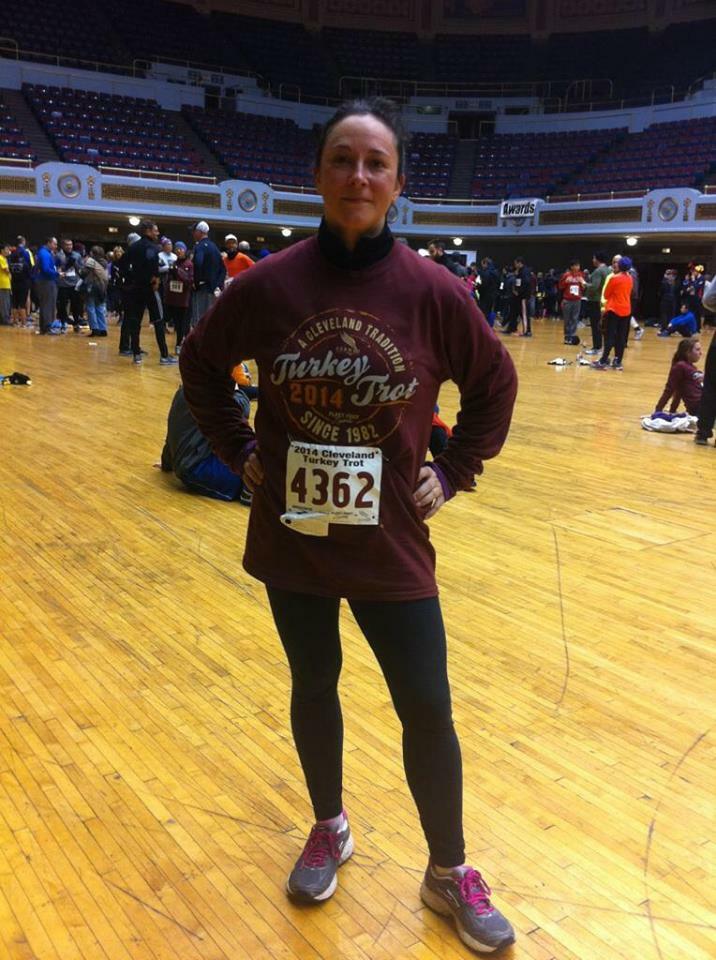Pictured After completing the 5-mile Turkey Trot, Thanksgiving morning, 2014

While googling your symptoms can lead you to worry more than is necessary about health symptoms, I think many people depend 100% on doctors to be both mind-readers and miracle workers in the 15 or so minutes they spend with you during an appointment, which may leave gaps in your care.
Yesterday I had an appointment with a new provider and I wanted to share how advocating for yourself can help you see who you need to see and then get the most out of the visit.
I have been slowly trying to increase the duration of my runs. While I have been a runner throughout my life, the ravages of aging have been particularly hard on my body. A horse riding accident many years ago caused some major back problems for me (degenerative disc disease, spondylolisthesis) which were made worse by going through pregnancy at age 39. My spondy went from Grade 1 to Grade 2, meaning there is more slippage of the vertebra past the (degenerating) disc, I also developed spinal stenosis or a narrowing of a covering of the nerves from the spine in the lumbar region, and I gained a tremendous amount of weight going through menopause, in part because I shattered my R ankle and could not walk for almost a year. It's been a journey.
This is not to whine about my issues (I did that in this article). I have been working for about 18 months on returning to running and though I have to jog extremely slowly to keep my heart rate in a safe zone for my age, I have been enjoying it. In fact, it's putting much less stress on my body to run at a very slow pace than when I was younger and running faster. But my sciatica is irritated by jogging and usually after about 20-25 minutes, my left foot goes numb due to the pain down the back of my leg. I feel like my gait is off slightly, like my body is trying to compensate for its weaknesses - the formerly shattered ankle, the tendency to "hold" on the left to protect from back pain. I wanted a gait analysis. I messaged my primary provider with a brief explanation and asked for a referral.
The referral went to the hospital's spine clinic, where I have been a patient for almost 20 years. I have seen many doctors there who have injected me, put me through tons of physical therapy, etc. My back problems are not solvable by that team and I wanted to work with someone who specializes in exercise - a sports medicine specialist. Messaged my primary again and she put in a different referral, and I made an appointment with a sports medicine doctor.
First, I did my research - on both the doctor and what I thought was happening with my gait and body that I'm unable to correct myself. When she asked why I was there I gave her a "presenting problem," which is a brief, 1-2 sentence description of why I was there: "Long-time back issues with L leg pain and L foot numbness when trying to increase duration of runs. Believe my gait is slightly off, wondering what can be done to adjust or fix it."
Fortunately, she said she had "started to go through my file" before the appointment which meant that at least she knew I had some major issues, though I doubted she was able to review my whole, massive chart. I gave her a slightly lengthier health history as it relates to my back, my abdominal surgical history (which prevents me from being able to strengthen my core), the ankle break, menopausal weight gain, and what I've been doing for the past 18 months to try to return to running, including strength training, supplements, lifting heavy, more rest between workouts, and a run/walk pattern to build CV endurance.
This helped her see that I at least know what was going on with my body and would circumvent her suggesting things I've already tried. She started asking questions about procedures I've had done and therapies I've tried and I ran those down for her.
I came dressed and ready to run in case they had a treadmill for gait analysis - they don't, but she put in a referral for me to see a specific therapist who deals with runners. She also discussed whether or not I had considered various surgeries and I talked about why I didn't pursue some of those.
She put me through range of motion exercises and said with my flexibility, she understood why I would be reluctant to have spinal fusion (to prevent further slippage of my vertebra/discs) and said she didn't have a single other patient my age who could bend forward and put their hands flat on the floor. Surgery can make moving like that dangerous. But she also told me about some new procedures available specifically for stenosis only, and said we need an updated image to understand what's pressing on that nerve to determine if I could be a candidate for that surgery.
I wholly agreed with this approach, so I am now going to attempt to get an updated MRI (very difficult for me because I cannot lie flat for more than about 10-15 minutes and you have to lie on your back with your legs extended for 20-30 minutes for an MRI) and I made an appointment to see the running therapist.
She also told me she admired my desire and determination to try to continue to pursue an activity I loved for so long, and reminded me of the importance of cross-training with other types of cardio, which I do, but perhaps not enough. She also discussed some adduction exercises I should do to try to fix the unevenness in my balance and hip height when standing on one leg, so I'm adding those in to my work.
She also pointed out that I have to be reasonable and understand that my body has limitations. I assured her I had no plans to try to run a marathon, though years ago it was a goal of mine for a long time.
I left with mixed emotions. I was pleased to receive praise for the hard work I've done to try to stay in shape and continue doing what I enjoy despite all the cards stacked against me. I was hopeful that the imaging and new therapist may give me some tools to gain improvement in dealing with my pain. But it's tough to hear about how uniquely bad all your health history is and hear someone sound almost amazed that you are even continuing to try to exercise and stay fit given your age and challenges.
I'm only 54 (55 in a couple weeks). I know this is "old" to younger people but I see so many people in their late 50s, 60s and 70s continuing to be active, and I want to be one of those people. Not just because it's good for me, but because I enjoy it.
I'm not sure what's ahead but wanted to share the details of how I advocated for myself to see the right specialist and then how I prepared for and had a discussion with that specialist so we can work together to try to make things better.
I hope this helps you in whatever your quest may be to get decent healthcare in our very flawed American healthcare system.
